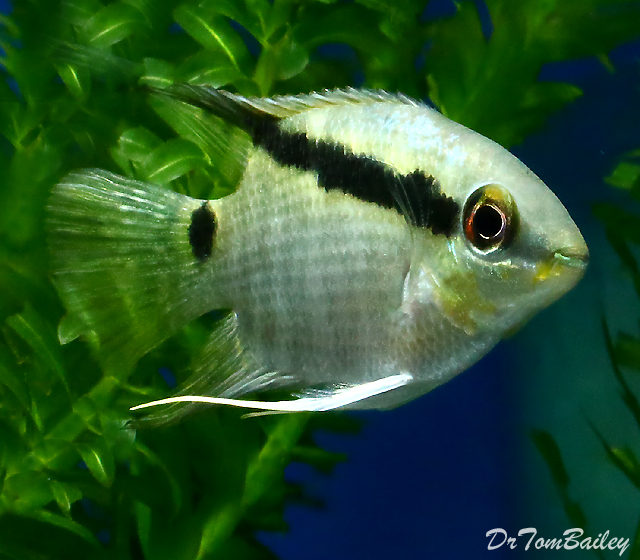
Premium Festivum Cichlid
Comment: Below in this page is lots of information about Festivums that we recommend you read, before ordering them.
Maximum Size: in aquariums Festivums often grow to be 3.5" to 4.5" long. All or almost all mammals like you, me, cats, dogs, and mice grow to a maximum size then grow smaller in old age. Unlike mammals, all or almost all fish species continue to grow larger throughout their entire lives; so infrequently there are very old, very large Festivums.
Behaviors: generally Festivums are mild tempered fish except jousting with each other and when spawning. Festivums enjoy examining the bottom, the mid-waters, and the water's surface. They're usually shy but often curious about people.
Compatibility: recommended tank mates include Angelfish, Eartheaters, Corydoras Catfish, Plecostomus Catfish, Pictus Catfish, ...
Behaviors: generally Festivums are mild tempered fish except when spawning. Festivums enjoy examining the bottom, the mid-waters, and the water's surface. They're usually shy but often curious about people. Festivums, like most fish, will eat smaller fish that fit into their mouths. Festivums will not do well in an aquarium with very aggressive fish like regular Jack Dempseys.
Temperature: 74 to 80 degrees F. Click here to learn about aquarium temperature, aquarium thermometers, and aquarium heaters.
Feeding: Premium Flakes, when small. Premium Pellets, when larger. Click here to learn more about and shop online for premium fish foods.
Water Conditions: ideally soft water with a pH of about 6 to 7, and this kind of water may be necessary for Festivum eggs to hatch. But this fish can easily adapt to harder more alkaline water with a pH up to 8. Collectors of wild Festivums have told us that during the dry season their water usually becomes harder and the pH may go up to 8. So these fish are able to gradually adapt to a variety of water conditions. Here in our facilities the water is hard and the pH is usually about 7.8. We ship them in this water.
Aquarium Size: eventually at least 50-gallons, and bigger will be better.
Decor: Festivums are easily startled and often swim off very fast and can jump. So it's important not to have anything sharp in their aquarium and to have a tight fitting aquarium cover or hood.
Gravel is not necessary, and many experienced aquarists have no gravel, but many other aquarists think a bare-bottom aquarium is too stark. So a very thin layer of so-called #2 gravel is a nice compromise.
Aquatic plants and/or aquarium-safe driftwood are both nice but not necessary.
Aquarium Filter: Bio-Wheel Filters are highly recommended. Two Penguin 350B filters will fit on the back of an 60-gallon aquarium and are ideal. Click here to learn more about aquarium filters.
The addition of Lava Rocks will keep nitrates in the ideal range. Click here to learn more using Lava Rocks in aquariums.
Life Span: at least 10-years and probably longer. So you should be sure that you can commit to taking care of them for many years.
Gender: Eventually females will be plumper, when they fill with eggs.
Breeding: get 6 or 8 young fish and raise them up together in a large aquarium. Eventually two of them will form a pair, and make the others miserable.
This species prefers to lay eggs on a large flat rock. The eggs hatch in a few days, and the parents mouthbrood the tiny babies, which are large enough to eat powdered food.
Click here for a lot more about breeding Tropical Fish in aquariums.
Popularity: For a long-long time Festivums have been a somewhat popular aquarium fish. Many aquarists seem to enjoy their mild and friendly personalities.
Names: Their scientific name is now Mesonauta festivus, which may in fact be a complex of several closely related species or subspecies. For a long time this species was misidentified as Cichlasoma Festivum.
Variations: There are two species that are often called Festivum. These species occur over a wide area in northern South America, so we expect there are variations, or there may be several closely related species or subspecies.
Recent research has revealed that Festivum's closest relatives are Angelfish.
We hope you've enjoyed reading these comments.
DrTom - 09/20/2015
Why Us?
All of our fish are Premium Quality Fish from the best suppliers in the world. Our fish have better health, more energy and brighter colors, as you can see in our pictures on this website.
We have 380-aquariums with lots-and-lots of popular aquarium fish plus lots-and-lots of rare fish!
We consider ourselves to be the link between the world's best sources of fish and the world's best customers. We love our work, and we are very responsible about caring for our fish and then shipping them carefully.
We also offer lots and lots of information about keeping and caring for pet fish, all from the knowledge of the Bailey Brothers, who have a combined total of 100+ years of experience as breeders, wholesalers, and retailers of pet fish!
Our fish and our customers are treated with the best of care, and we work energetically everyday to make sure every customer enjoys their new fishy friends.
When you purchase pet fish from us, you know you're receiving premium quality fish and premium quality service.
"Received my fish last night and was so pleased! They all arrived alive and appeared to be healthy.
"Once in the tank, they became very active and are now thriving in their new home.
"Beautiful fish, I asked for color and aquariumfish delivered. Processing and shipping was extremely quick."

About AquariumFish.net

Nevin and DrTom, the Bailey Brothers
This website is owned and operated by the Bailey Brothers, DrTom and Nevin, who've been together in the fish business for more than 50-years.
The Product Manager has been with the company for more than 35-years.
So we feel very confident that this is the fishiest crew anywhere.
